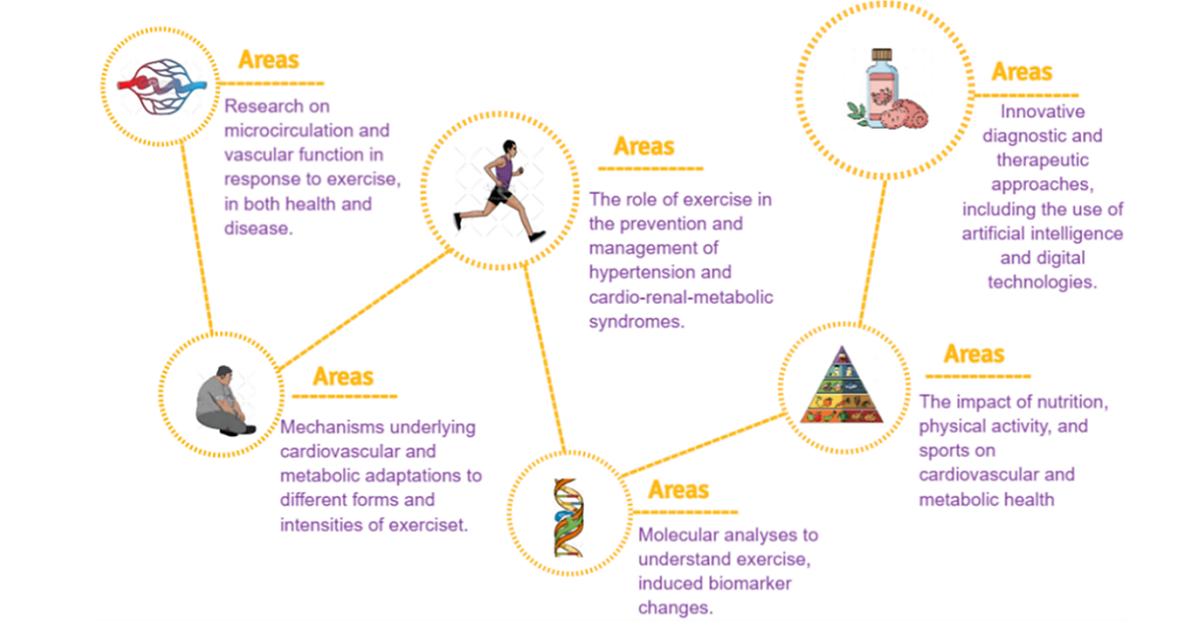Innovative Insights into Cardiovascular and Metabolic Responses to Exercise
A special issue of Applied Sciences (ISSN 2076-3417). This special issue belongs to the section "Biomedical Engineering".
Deadline for manuscript submissions: 20 January 2026 | Viewed by 231

Special Issue Editors
Interests: microcirculation; vascular physiology; cardiovascular physiology; hypertension; cardio-reno-metabolic syndromes; molecular biology; molecular analysis; nutrition; physical activity; sports
Interests: microcirculation; vascular physiology; oxidative stress; obesity; hypertension; molecular biology; molecular analysis; nutrition; physiotherapy
Special Issues, Collections and Topics in MDPI journals
Interests: oxidative stress; young adult; cardiovascular disease and disorders; dietary assessment; N-3 polyunsaturated fatty acid
Special Issues, Collections and Topics in MDPI journals
Interests: microcirculation; body composition; endothelial function; vascular physiology; nutrition; cardiovascular physiology; arteries; endothelium; salt intake
Special Issues, Collections and Topics in MDPI journals
Special Issue Information
Dear Colleagues,
Given the increasing global burden of cardiovascular diseases, there is an urgent need for innovative approaches to prevention and therapy. In this context, exercise and physical activity have been recognized as some of the most effective and accessible tools for improving cardiovascular health. However, with the advent of digital health and artificial intelligence, a new era of personalized exercise medicine is emerging, where individual responses to physical activity can be more precisely monitored, analyzed, and optimized through digital phenotyping and advanced algorithms.
This Special Issue is dedicated to presenting the latest ideas, research findings, and innovative approaches to understanding cardiovascular and metabolic responses to exercise. Special emphasis is placed on the integration of digital technologies and artificial intelligence into research and practice, with the aim of advancing the prevention, diagnosis, and treatment of cardiovascular diseases. We explore how exercise influences microcirculation, vascular and cardiovascular physiology, hypertension, cardio–renal–metabolic syndromes, molecular biology, nutrition, and overall health outcomes, taking into account the opportunities provided by digital health.
Relevant areas for this issue include, but are not limited to, the following:
Research on microcirculation and vascular function in response to exercise, in both health and disease.
Mechanisms underlying cardiovascular and metabolic adaptations to different forms and intensities of exercise.
The role of exercise in the prevention and management of hypertension and cardio–renal–metabolic syndromes.
Application of advanced molecular analyses to understand exercise-induced biomarker changes.
The impact of nutrition, physical activity, and sports on cardiovascular and metabolic health.
Innovative diagnostic and therapeutic approaches, including the use of artificial intelligence and digital technologies, for assessing responses to exercise.
This Special Issue will publish high-quality, original research papers in the following areas:
Microcirculation and vascular physiology in response to exercise.
Cardiovascular physiology and hypertension: exercise interventions and outcomes.
Cardio–renal–metabolic syndromes: exercise as prevention and therapy.
Molecular biology and analysis of exercise responses.
Nutrition, physical activity, and sports: optimizing cardiovascular and metabolic health.
Integrated and translational research on exercise responses.
Keywords: cardiovascular responses to exercise; metabolic responses to exercise; microcirculation; vascular physiology; hypertension; cardio–renal–metabolic syndrome; molecular biology; molecular analysis; nutrition, physical activity; sport; prevention; biomarkers; artificial intelligence
We invite you to contribute your latest findings and join us in advancing knowledge on cardiovascular and metabolic responses to exercise!
Dr. Petar Šušnjara
Dr. Anita Matić
Dr. Nikolina Kolobarić
Dr. Ana Stupin
Guest Editors
Manuscript Submission Information
Manuscripts should be submitted online at www.mdpi.com by registering and logging in to this website. Once you are registered, click here to go to the submission form. Manuscripts can be submitted until the deadline. All submissions that pass pre-check are peer-reviewed. Accepted papers will be published continuously in the journal (as soon as accepted) and will be listed together on the special issue website. Research articles, review articles as well as short communications are invited. For planned papers, a title and short abstract (about 250 words) can be sent to the Editorial Office for assessment.
Submitted manuscripts should not have been published previously, nor be under consideration for publication elsewhere (except conference proceedings papers). All manuscripts are thoroughly refereed through a single-blind peer-review process. A guide for authors and other relevant information for submission of manuscripts is available on the Instructions for Authors page. Applied Sciences is an international peer-reviewed open access semimonthly journal published by MDPI.
Please visit the Instructions for Authors page before submitting a manuscript. The Article Processing Charge (APC) for publication in this open access journal is 2400 CHF (Swiss Francs). Submitted papers should be well formatted and use good English. Authors may use MDPI's English editing service prior to publication or during author revisions.
Keywords
- cardiovascular health
- exercise medicine
- artificial intelligence
- metabolic adaptations
- digital health
- prevention and therapy
Benefits of Publishing in a Special Issue
- Ease of navigation: Grouping papers by topic helps scholars navigate broad scope journals more efficiently.
- Greater discoverability: Special Issues support the reach and impact of scientific research. Articles in Special Issues are more discoverable and cited more frequently.
- Expansion of research network: Special Issues facilitate connections among authors, fostering scientific collaborations.
- External promotion: Articles in Special Issues are often promoted through the journal's social media, increasing their visibility.
- Reprint: MDPI Books provides the opportunity to republish successful Special Issues in book format, both online and in print.
Further information on MDPI's Special Issue policies can be found here.







